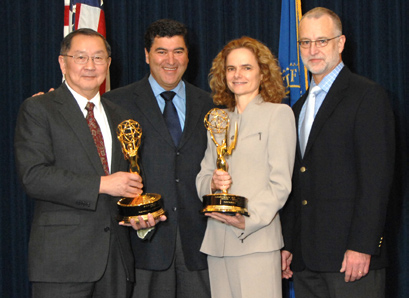| |
 |
|
|
|
|
| |
Enjoying the Emmy honors are (from l) NIAAA director Dr. Ting-Kai Li, NIH director Dr. Elias Zerhouni, NIDA director Dr. Nora Volkow and Dr. Mark Willenbring, an NIAAA division director. |
|
At the Creative Arts Emmy Awards ceremony,
held recently in Los Angeles, the Academy
of Television Arts and Sciences honored the National Institute on Drug Abuse and the National Institute on Alcohol Abuse and Alcoholism
with the Board of Governors Award for their work with HBO on The Addiction Project. The award is the academy’s highest honor and is given to individuals or organizations committed
to important social causes. It marks the first time that NIH institutes have received an Emmy for television programming.
“This honor reflects our commitment to effectively
communicate research results to the public,”
said NIH director Dr. Elias Zerhouni.
The Addiction Project is a 14-part documentary series and multimedia initiative revealing the science of addiction, treatment options, recovery
and the costs of untreated addiction to families and society. The series, which featured a diverse group of people who were battling alcohol or drug addiction together with NIH scientists and addiction clinicians from around the country, originally aired Mar. 15 to an audience
of more than 13 million viewers. An additional
1 million viewed the program through HBO on Demand.
In the months since then, almost 3 million viewed the content at www.hbo.com/addiction and affiliated sites, with 600,000 video streams. Still more have purchased the DVDs or a companion
book, available commercially. In addition,
support from the Robert Wood Johnson Foundation enabled addiction advocacy groups, including Community Anti-Drug Coalitions of America, Join Together, and Faces and Voices of Recovery, to promote the series through house parties and other grassroots activities.
In acceptance remarks, NIDA director Dr. Nora Volkow said, “I want to thank the Academy for its recognition, and HBO for its vision in developing
this project, which has allowed us to reach millions with our message—that addiction
is a chronic, relapsing brain disease. It does not care if you are rich or poor, famous or unknown, a man or woman, or even a child. If science-based treatment principles are followed, addiction treatment can work and people can reclaim their lives.” Volkow was featured prominently in the documentary, as was Dr. Mark Willenbring, director of NIAAA’s Division of Treatment and Recovery Research, and NIH grantees from across the country.
Currently, addiction affects 23.2 million Americans—of whom only about 10 percent are receiving the treatment they need. “HBO’s Addiction Project afforded
us the opportunity to directly acquaint viewers with available evidence-based medical and behavioral treatments,” said NIAAA director Dr. Ting-Kai Li. “This is especially important for disorders that for many years were treated outside the medical mainstream.”
Each institute received an Emmy statuette. The centerpiece documentary can still be seen on HBO’s web site, www.hbo.com/addiction/. 